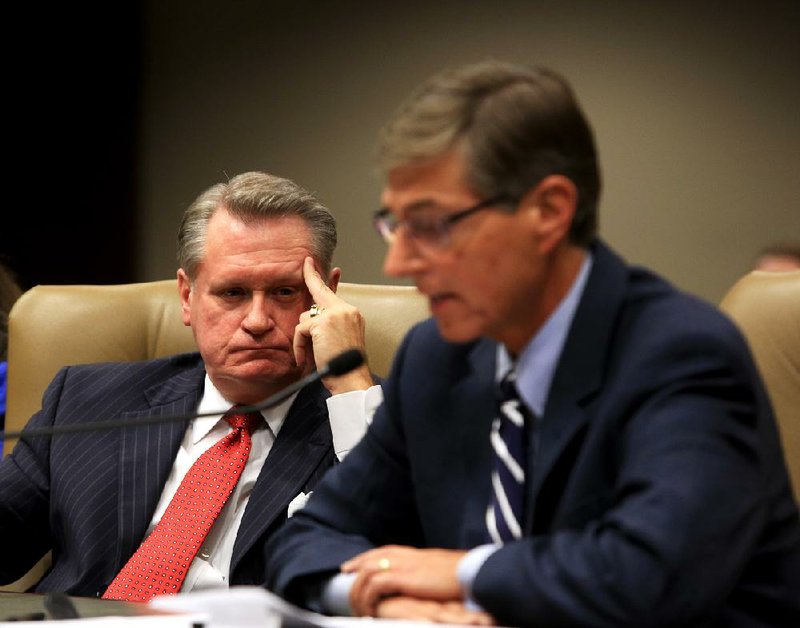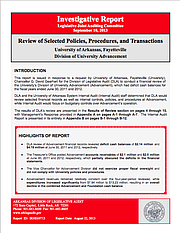The former chief spokesman for the University of Arkansas at Fayetteville told legislators Friday, under oath, that Chancellor G. David Gearhart ordered top officials in his financially troubled fundraising division to destroy and stop creating budget-related documents so that the records wouldn’t be available for public view.
Testifying before the Legislative Joint Auditing Committee, John Diamond, whom Gearhart fired in August, described “a culture of secrecy that developed and grew” as UA administrators realized the size of a multimillion-dollar deficit run up by the university’s fundraising operation.
Gearhart, also under oath, denied Diamond’s accusation, saying: “I have never said to anybody that they should destroy documents. … His accusations today are astounding to me. They are not accurate. I hope he has proof of them.”
He went on to describe Diamond as “a disgruntled employee. … I am shocked and I find it pathetic that we have a person here who has been dismissed from the university. He cannot prove it. … He is entitled to his opinion. But he is not entitled to his facts.”
State law says that once a public document is requested under Arkansas’ Freedom of Information Act, it cannot be destroyed, legal experts say. State law doesn’t regulate the creation of public documents.
RELATED ARTICLES
http://www.arkansas…">Six UA projects gain approval of trusteeshttp://www.arkansas…">Lawmakers raise issue of UA ‘trust’
Afterward, state Rep. Kim Hammer, R-Benton, co-chairman of the Legislative Joint Auditing Committee, asked, “Are we dealing with a disgruntled employee who has legitimate claims or a disgruntled employee who doesn’t have legitimate claims?
“The magnitude of what Mr. Diamond was saying, I think it warrants at least keeping the door open to where [the auditing committee] can get to the bottom of it and find out what it is for sure,” Hammer said.
Diamond and his former boss appeared before the committee in connection with an audit that was critical of the University Advancement Division, which overspent its budget last fiscal year by $4.19 million.
The legislators agreed Friday morning to continue the committee’s inquiry into the spending deficit.
Friday afternoon, the University of Arkansas board of trustees canceled a meeting planned for today in Fayetteville that would have allowed its Audit Committee, and then the full board, to take action on the Advancement Division audit.
“The legislative audit isn’t closed,” said Chairman Jane Rogers. “So there was no sense in us meeting.”
Rogers said the trustees will call a special meeting sometime within the next 30 days to take up the Advancement Division audit.
The audit, which Gearhart requested in February, also found that the division overspent its fiscal 2011 budget by $2.14 million.
State auditors agreed with an earlier review by university officials that former fundraising chief Brad Choate didn’t exercise proper fiscal oversight and that his budget manager, Joy Sharp, was responsible for “inadequate and incorrect accounting.”
Both were demoted but were allowed to remain on the university payroll until their contracts expired June 30.
The state audit also questioned the accounting practices and other actions of the university’s two top finance officers: Vice Chancellor of Finance and Administration Don Pederson, and Associate Vice Chancellor and Treasurer Jean Schook.
Auditors forwarded three concerns found in their report to a state prosecutor for review, a practice that auditors said is not unusual.
Also, auditors wrote that they “experienced difficulty obtaining Advancement financial records, which potentially limited the scope of this review.”
On Friday, the Legislative Joint Auditing Committee spent almost two hours asking questions about university finances and the audit findings of Gearhart, Pederson and Schook, and UA System President Donald Bobbitt.
Then the legislators heard from Diamond, whom they had invited to take part.
Before any testimony, Hammer took the unusual step of swearing in, one by one, Diamond, Gearhart and the rest of the UA officials. Hammer told another legislator that he elicited the oaths in anticipation of discrepancies among the speakers.
In his opening statement, Diamond said: “Members of the Advancement Division leadership team and staff received directives from key individuals that resulted in the destruction of documents relevant to the audits and to Freedom of Information Act requests.
“This occurred both before and after [Gearhart’s Feb. 5] request” that the Legislative Audit Division and the UA System Internal Audit staff review the Advancement Division’s spending, Diamond said.
“These two reasons are in part why auditors could not find documents they sought, and that’s why so few responsive documents were given to the media during the past several months,” Diamond said.
In response to legislators’ questions, he said he had been terminated from his UA post “because of differences with my employers.” He said he signed documents to release his personnel record, which he said contained satisfactory and better evaluations during his tenure, until recent months.
Diamond has said he was dismissed because he differed with Gearhart and others over Freedom of Information Act requirements and releasing documents to the media.
The Jan. 14 meeting in which the document issue came up, Diamond told the lawmakers, was led by Gearhart, who was then acting as interim head of the Advancement Division as well as chancellor. At least eight members of the Advancement Division’s top staff were present, including Diamond, he said.
“[Gearhart] got angry that there have been documents that had been retained about the gift tax [proposal to help finance fundraising operations] and a financial report distributed by [new budget officer] Denise Reynolds about where she saw the financial picture at that time,” Diamond said.
“The chancellor got upset and angry. He made several statements that concluded with getting rid of those documents and not creating others.”
“I deny I have told anyone to destroy documents,” Gearhart told legislators.
He went on to clarify that he meant documents that had been requested under state law.
“There are times we have working papers we do not keep,” Gearhart said. “If we have been FOI-ed [received a Freedom of Information request], we keep track. But every day there are documents I tear up. But we have never, never refused to send a document [under a Freedom of Information Act request].”
Diamond promised to provide legislators and the Legislative Audit Division with supporting documents and names of others who were at the meeting.
To legislators and in a media briefing after the hearing, Diamond said Reynolds also directed employees to carry out a “housecleaning” of financial records early this year. Employees were asked to shred boxes of financial records days after Gearhart called in state auditors on Feb. 5, Diamond said.
Reynolds said Friday in an email that the allegations “are false. I did not order a ‘house cleaning’ of documents, and no one ordered me to do so.”
Reynolds went on to say that “it came to my attention that the division was unnecessarily paying storage costs for older paper records at multiple locations (such as search committee records, leave reports, invoices, and the like) that were no longer needed for business purposes and had no bearing on University Advancement deficits.
“None of these records was requested by persons conducting the University’s internal review or auditors,” she wrote, nor were they required to be kept under university policies. “Additionally, we maintain electronic copies of all payment records,including Foundation payment authorization forms,” she wrote.
“This process occurred over a number of months, beginning in fall 2012 and extending through the summer of 2013. … A member of my staff communicated with appropriate officials throughout Advancement. … At no time did Mr. Diamond or any other person express any concerns about this process.”
It wasn’t immediately clear whether any documents discussed Friday had been requested earlier under the Arkansas Freedom of Information Act by the Arkansas Democrat-Gazette or others.
Robert Steinbuch, a professor of law at the University of Arkansas at Little Rock, said state law is very clear on destroying public records after they’ve been requested under the Freedom of Information Act.
“That’s easy. You can’t destroy it, and destruction of that document is clearly a violation of Arkansas FOIA,” Steinbuch said.
But directing public officials to stop creating documents is a different matter because the state open-records law doesn’t compel the creation of documents, just “the turning over of documents once created and requested,” he said.
Still, Steinbuch said, it would go against the spirit of government transparency for public officials to direct their staffs to stop creating documents just to avoid the public finding out.
That’s particularly the case with budget documents, he said.
“Budgets are perhaps the single most obvious and compelling piece of documentary material that should be turned over to the public pursuant to the FOIA,” he said. “If a government official is simply not putting down any budget information on paper so as to avoid the FOIA, that’s certainly contrary to what those who created the FOIA had in mind.”
Deficit spending by UA’s Advancement Division has been discussed since Gearhart announced the problem Dec. 3.
On Friday, legislators and auditors said that part of their goal is to learn why the deficit wasn’t identified earlier.
Information for this article was contributed by Michael R. Wickline and Tracie Dungan of the Arkansas Democrat-Gazette.
Front Section, Pages 1 on 09/14/2013


